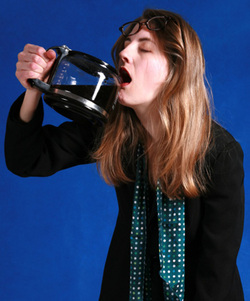The Dangers of Caffiene

Ellen White's Comments:
Ellen White discussed coffee and tea rather than caffeine. The word "coffee" appears 549 times, and "tea" 586 times; coffee and tea are used together 515 times.
Ellen White discussed the effect of caffeine on the mind, saying that it decreases brain activity, although it temporarily excites and increases energy with acute caffeine use. Furthermore, she realized the problem with chronic use. She said this about coffee and tea: "Tea has an influence to excite the nerves, and coffee benumbs the brain; both are highly injurious. You should be careful of your diet."
On several occasions Ellen White drank green or black tea when she was sick. But other than these rare exceptions she did not drink coffee or caffeinated tea, or keep it in her house. She occasionally used catnip, red clover blossom, hop, and beef tea--all non-caffeinated drinks.
Although Ellen White did not have the benefit of the scientific knowledge now available, she concluded that coffee and tea impair the functioning of the mind and should be taken only rarely, for medicinal purposes on a short-term basis. She also discussed how harmful caffeine is on our mind and related it to our spiritual lives. Writing in the Review and Herald, she said of coffee and tea, "Those nerve irritants are wearing away the life forces, and the restlessness caused by shattered nerves, the impatience, the mental feebleness, becomes a warning element against spiritual progress." Truly, when the mind is clouded, our spiritual lives will also be impaired.
White's writings indicate that people should drink coffee and tea only for rare medicinal purposes. Medical knowledge has increased, and many more medicines are now available for treatment. In addition, coffee and tea are not necessary today because many medicines that do not cause anxiety, tolerance, post-use crash, or the potential for addiction are available.
Ellen White discussed coffee and tea rather than caffeine. The word "coffee" appears 549 times, and "tea" 586 times; coffee and tea are used together 515 times.
Ellen White discussed the effect of caffeine on the mind, saying that it decreases brain activity, although it temporarily excites and increases energy with acute caffeine use. Furthermore, she realized the problem with chronic use. She said this about coffee and tea: "Tea has an influence to excite the nerves, and coffee benumbs the brain; both are highly injurious. You should be careful of your diet."
On several occasions Ellen White drank green or black tea when she was sick. But other than these rare exceptions she did not drink coffee or caffeinated tea, or keep it in her house. She occasionally used catnip, red clover blossom, hop, and beef tea--all non-caffeinated drinks.
Although Ellen White did not have the benefit of the scientific knowledge now available, she concluded that coffee and tea impair the functioning of the mind and should be taken only rarely, for medicinal purposes on a short-term basis. She also discussed how harmful caffeine is on our mind and related it to our spiritual lives. Writing in the Review and Herald, she said of coffee and tea, "Those nerve irritants are wearing away the life forces, and the restlessness caused by shattered nerves, the impatience, the mental feebleness, becomes a warning element against spiritual progress." Truly, when the mind is clouded, our spiritual lives will also be impaired.
White's writings indicate that people should drink coffee and tea only for rare medicinal purposes. Medical knowledge has increased, and many more medicines are now available for treatment. In addition, coffee and tea are not necessary today because many medicines that do not cause anxiety, tolerance, post-use crash, or the potential for addiction are available.
Hogs & Other Hazards (E-book)
God cares about what you do with your body—even what you eat! This concise but effective booklet clearly explains four Bible texts that seem, at first glance, to suggest that people can eat foods God really doesn’t want them to.
